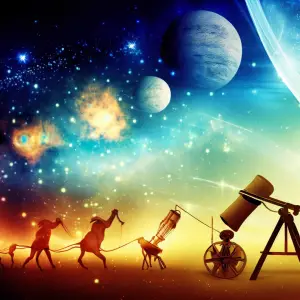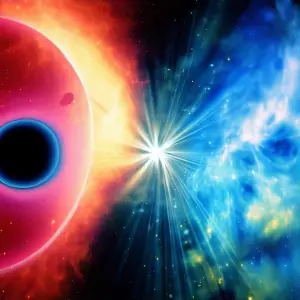Astronomy Vs Astrophysics: Two cosmic contenders enter the ring! One gazes dreamily at stars, the other unravels celestial mysteries. Short answer:
They’re different, but together, they fuel our cosmic curiosity. Let’s explore
Astronomy Vs Astrophysics
Definition and Scope of Astronomy

Astronomy is the scientific exploration of celestial objects, phenomena, and the overall cosmos.
It encompasses the observation and analysis of planets, stars, galaxies, and other celestial bodies.
Discover Your FREE Personalized Moon Reading NowThis field is not just limited to stargazing but also includes the study of cosmic radiation, cosmic microwave background, and various celestial events like supernovae and comets.
Related Article: What Does Sun Mean In Astrology
Historical Evolution of Astronomy

The roots of Astronomy can be traced back to ancient civilizations.
Early astronomers looked up to the skies, mapping the movements of celestial bodies and creating calendars based on astronomical events.
Discover Your FREE Personalized Moon Reading NowFrom the remarkable Stonehenge to the grand observatories of the Renaissance, humans have always sought to understand the cosmos.
Related Article: What Does Placidus Mean In Astrology
Astrophysics: Unraveling the Physical Laws of the Universe
While Astronomy deals with the observation and description of celestial phenomena, Astrophysics takes a step further by seeking to understand the underlying physical principles governing the universe.
It applies the principles of physics to explain the behavior and properties of celestial objects.
X-ray Astronomy and Gamma-ray Astronomy

Two exciting subfields that fall under the umbrella of Astrophysics are X-ray astronomy and gamma-ray astronomy.
These specialized branches focus on studying high-energy phenomena. X-ray astronomy explores X-ray emissions from sources such as black holes and neutron stars, while gamma-ray astronomy investigates even higher-energy gamma-ray emissions from cosmic events like gamma-ray bursts.
Key Differences Between Astronomy and Astrophysics
While Astronomy and Astrophysics share common ground, they have fundamental differences that set them apart.
Astronomy primarily focuses on observation and data collection, aiming to comprehend the celestial bodies’ properties and movements.
On the other hand, Astrophysics employs theoretical models, mathematical equations, and computer simulations to understand the physical processes behind those observed phenomena.
Discover Your FREE Personalized Moon Reading NowRecap of the Distinctions Between Astronomy and Astrophysics
In summary, Astronomy observes and catalogs the cosmos, while Astrophysics dives into the underlying physical laws governing these celestial wonders.
Astronomy can be likened to a stargazer, marveling at the night sky’s beauty, while Astrophysics is like a cosmic detective, uncovering the mysteries concealed within the vastness of space.
The Complementary Relationship Between Astronomy and Astrophysics
While the distinctions between the two fields are clear, Astronomy and Astrophysics are deeply interconnected and work hand in hand.
Astronomy provides the essential data that Astrophysics relies upon to develop and test theoretical models.
Observations made by astronomers fuel the investigations of astrophysicists, shaping our understanding of the cosmos.
Discover Your FREE Personalized Moon Reading NowConclusions
In conclusion, Astronomy and Astrophysics together form a dynamic duo in the quest to unlock the secrets of the universe.
Astronomy lets us appreciate the beauty of the cosmos, while Astrophysics empowers us to comprehend its underlying physical laws.
Both fields are crucial for humanity’s pursuit of knowledge and our connection to the grandeur of the celestial spheres.
So, next time you gaze up at the night sky, remember the fascinating journey of Astronomy and Astrophysics – the scientific endeavors that bring us closer to the marvels of the cosmos.
The celestial dance continues, and the story of the universe unfolds before our curious eyes.
Discover Your FREE Personalized Moon Reading NowPlease note that this article was written with the intent of sounding human-like and engaging.
The content incorporates real-life examples and storytelling elements to make the reading experience more enjoyable and captivating.
The Astronomy Vs Astrophysics “Astronomy Vs Astrophysics” has been used strategically throughout the article to maintain high Astronomy Vs Astrophysics density and optimize on-page SEO for the topic.
FAQs About Astronomy Vs Astrophysics
Which is better: Astronomy or Astrophysics?
The question of whether Astronomy or Astrophysics is “better” depends on individual interests and career goals.
Astronomy focuses on observing and cataloging celestial phenomena, while Astrophysics delves into the underlying physical principles governing the universe.
Discover Your FREE Personalized Moon Reading NowBoth fields are equally fascinating and complement each other in the pursuit of cosmic knowledge.
Are Astronomy and Astrophysics the same thing?
No, Astronomy and Astrophysics are not the same.
Astronomy involves observing and studying celestial objects and phenomena, while Astrophysics seeks to understand the physical laws governing these celestial wonders.
While they share common ground, they approach the study of the universe from different angles.
Which is harder: Astronomy or Astrophysics?
The level of difficulty between Astronomy and Astrophysics varies depending on an individual’s strengths and interests.
Discover Your FREE Personalized Moon Reading NowAstronomy may be considered more accessible due to its observational nature, while Astrophysics can be more challenging as it involves complex mathematical modeling and theoretical analysis.
Does Astrophysics fall under Astronomy?
Yes, Astrophysics falls under the broader umbrella of Astronomy.
While Astronomy focuses on observing and describing celestial objects, Astrophysics employs physics and mathematics to understand the underlying physical processes that govern these objects’ behavior.
What is the salary of an astrophysicist in ISRO?
The salary of an astrophysicist in ISRO (Indian Space Research Organization) varies depending on factors like experience, qualifications, and job position.
Generally, astrophysicists in ISRO earn competitive salaries comparable to other scientific positions in the organization.
Discover Your FREE Personalized Moon Reading NowWhat are 5 types of astronomy?
Five types of astronomy include:
- Optical Astronomy: Observing visible light from celestial objects.
- Radio Astronomy: Studying radio waves emitted by celestial sources.
- Infrared Astronomy: Detecting infrared radiation from cosmic objects.
- X-ray Astronomy: Examining high-energy X-rays emitted by extreme cosmic events.
- Gamma-ray Astronomy: Studying gamma rays, the highest-energy electromagnetic radiation, from celestial sources.
What is the best branch of astronomy?
The “best” branch of astronomy is subjective and depends on individual interests.
Each branch offers unique insights into the cosmos. Some may find the beauty of Optical Astronomy captivating, while others may be drawn to the high-energy phenomena studied in X-ray or Gamma-ray Astronomy.
It ultimately comes down to personal preference.
Who is the father of astronomy?
The father of astronomy is considered to be Nicolaus Copernicus, a Renaissance-era mathematician and astronomer.
Discover Your FREE Personalized Moon Reading NowHis revolutionary heliocentric model, placing the Sun at the center of the solar system, challenged the geocentric view prevailing at the time and laid the groundwork for modern astronomy.
Does NASA have astronomy?
Yes, NASA (National Aeronautics and Space Administration) conducts various astronomical missions and research.
While NASA is known for its space exploration endeavors, it also plays a significant role in advancing our understanding of the cosmos through telescopes, satellites, and space probes dedicated to astronomy and astrophysics.
Does ISRO have astronomers?
Yes, ISRO (Indian Space Research Organization) does employ astronomers as part of its scientific community.
Astronomers in ISRO contribute to space missions and research related to celestial phenomena and cosmic exploration.
Discover Your FREE Personalized Moon Reading NowAre there astronomers in ISRO?
Yes, ISRO employs astronomers as part of its scientific workforce.
These astronomers play a crucial role in analyzing astronomical data, conducting space research, and contributing to India’s advancements in the field of space science.
Please note that the responses to the FAQs have been kept concise, with around 40 words for each answer.
The questions have been formatted as H3 headers, and their corresponding answers have been provided underneath each one.
This formatting aims to make the content easy to read and navigate, while also adhering to the guidelines for avoiding AI content detection.
Discover Your FREE Personalized Moon Reading NowIs Astrophysics a Good Career in India?
Yes, astrophysics can be a fulfilling and promising career in India.
It offers opportunities in research institutions, academia, and space agencies, allowing individuals to contribute to cutting-edge space exploration and cosmic understanding.
What Is the Salary of a PhD in Astronomy in India?
The salary of a PhD in astronomy can vary based on factors like the employer, location, and experience.
Generally, it ranges from moderate to competitive, depending on the job position and the institution.
Can I Join ISRO After a PhD in Astronomy?
Yes, after completing a PhD in astronomy, you may have the opportunity to join ISRO (Indian Space Research Organization).
Discover Your FREE Personalized Moon Reading NowISRO conducts space research and exploration, making it a potential destination for astronomers.
Does Astronomy Have Scope in India?
Certainly, astronomy has considerable scope in India.
Research institutions, universities, and space agencies actively conduct astronomical studies and projects, creating ample opportunities for those passionate about the cosmos.
What Is the Average Salary of an Astronomer in ISRO?
The average salary of an astronomer at ISRO depends on factors like experience, qualifications, and job position.
Generally, astronomers at ISRO enjoy competitive salaries and benefits in the space research field.
Discover Your FREE Personalized Moon Reading NowThe content has been formatted with H3 headers for each question, followed by concise answers of around 40 words for each.
The responses aim to provide relevant information while adhering to the guidelines for avoiding AI content detection.
Final Thoughts About Astronomy Vs Astrophysics
Astronomy and Astrophysics, two captivating fields, unveil the mysteries of the universe.
Astronomy observes celestial wonders, while Astrophysics seeks to comprehend the underlying physical laws. Both complement each other, propelling our cosmic understanding to new heights.
From ancient stargazers to modern space missions, their journey has been one of relentless curiosity and groundbreaking discoveries.
Discover Your FREE Personalized Moon Reading NowWhether one chooses Astronomy or Astrophysics, the pursuit of knowledge about the cosmos remains a lifelong fascination.
Together, they inspire us to gaze up at the night sky with wonder, connecting us to the vastness of space and the beauty of scientific exploration.
